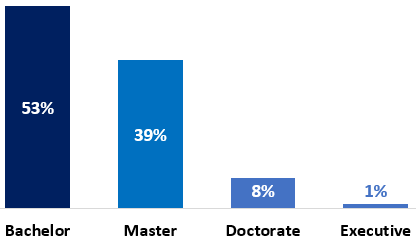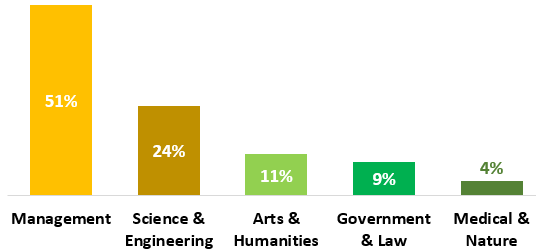Decision-makers in medium and large companies mostly hold Bachelor’s and Master’s degrees:

While management, science, and engineering, are leading degrees among today’s executives, the academic specialties at the top of today’s corporate organizational charts are diverse:

This diversity reflects the wide-ranging areas of expertise required to handle the daily challenges that confront today’s C-Suite executives.
The data in this study was extracted on February 1, 2022 from our database of a million executive biographies.
These one million executives are the decision makers (Board, CEO, N-1, N-2 to the CEO) at the largest 80,000 companies in the world.
The early years
From the beginning of the global emergence of colleges and universities in the European Middle Ages, the Bachelor of Arts has proven far and away the most common degree of those completing three and four year academic programs.

Its core fields initially were seven liberal arts specialties: grammar, rhetoric, logic, mathematics, geometry, astronomy, and music.
Graduate studies emerged later: The word Master from the Latin word Magister for professors, and then the word Doctor for even higher qualified professors, were used to recognize formally educated scholars.
At the end of the 19th century, the Doctor of Philosophy degree became the most popular doctoral degree globally, recognizing completion of the formal academic training necessary to observe the world and to question the established order, which permitted these highly educated individuals to become recognized experts in any niche of the sciences or humanities.
1. Bachelor:
Obtaining a Bachelor’s degree at a university or college usually takes three to four years. The most popular Bachelor’s degrees in our corporate organizational charts of executives at the world’s 80,000 largest companies include:
- Bachelor of Arts (or BA) comes from the Latin Baccalaureus Artium. Its courses are mostly related to arts, communications, design, journalism history, humanities, journalism language, literature, philosophy, political science, or social science.
- Bachelor of Laws (or LLB) comes from the Latin Legum Baccalaureus. The double L comes from abbreviating in Latin a plural (Legum = Laws) by doubling the first letter. The curriculum includes civil, constitutional, or criminal laws.
- Bachelor of Science (or BS or BSc) comes from the Latin Baccalaureus Scientae. Its courses focus mainly on biology, chemistry, computer, economics, engineering,electronics, mathematics, mechanics, physics, science, or technology.
Other popular Bachelor’s degrees include:
● Bachelor of Business Administration (or BBA),
● Bachelor of Commerce (or BCom),
● Bachelor of Engineering (or BE).
For example:
– Director at Apple, Andrea, completed a Bachelor of Arts in English at Princeton University.
– Chief Executive Officer at Dropbox, Drew, completed a Bachelor of Science in Computer Science at the Massachusetts Institute of Technology.
2. Master:
Obtaining a Master’s degree at a university usually takes five to six years. The most popular Master’s degrees in our corporate organizational charts are:
- Master of Business Administration (or MBA), a graduate degree mostly specializing in accounting, banking, commerce, finance, hospitality, international, management, marketing, organizational management, real estate, or business strategy.
- Master of Science (MS or MSc), a graduate degree mostly specializing in chemical engineering, civil engineering, computer science, electrical engineering, logistics, mechanical engineering, or transportation.
Other popular Master’s degrees include:
● Master of Arts (or MA),
● Master of Education (or MEd),
● Master of Engineering (ME or MEng),
● Master of Fine Arts (MFA),
● Master of Laws (LLM),
● Master of Public Administration (MPA).
For example:
– Chief Executive Officer at Amazon, Andrew, completed a Master of Business Administration from Harvard Business School,
– Chief Executive Officer at Alphabet Inc., Sundar, completed a Master of Science from Stanford University.
3. Doctorate:
- Doctor of Philosophy (PhD) has become a generic term for many Doctorate degrees, including those with academic training in science, humanities, and management. It usually takes six to eight years to obtain a PhD. A thesis representing original research, that expands the boundaries of knowledge is required.
- Juris Doctor (JD or LLD, derived from Latin’s Legum Doctorate). Popular JD and LLD specialties include business law, commercial law, compliance, corporate law, employment law, finance, intellectual property, and international or country-specific tax laws. Studies for the JD or LLD typically take three to eight years depending on the country.
- Medical Doctorate (MD, derived from Latin’s Medicinae Doctor). This is a professional degree for general practitioners, often completed with specialization in genetics, microbiology, pharmacy, oncology, ophthalmology, psychiatry, radiology, surgery, or other medical specialties.
For example:
– Corporate Vice President, Chief Scientist at Microsoft, Jaime, completed a PhD in Computer Science from Massachusetts Institute of Technology,
– Chief Ethics and Compliance Officer and Chief Patent Counsel at P&G, Ken, obtained a Juris Doctor from the University of Cincinnati College of Law,
– Director at GSK, Laurie, obtained a Medical Doctorate from Harvard Medical School.
4. Executive programs:
Obtaining an Executive Program Degree at a university or a college usually requires 10 to 20 years of professional work experience, including senior management positions.
The programs themselves typically take several weeks to several months to complete. Covered subjects include finance, international affairs, leadership, management, marketing, organization, product, technology, and business strategy.
The purpose of these programs is to assist executives to expand their formal education and qualify them for higher career levels.
These programs also offer an opportunity to refresh their academic skills. The curriculum usually takes place on the campuses of mostly prestigious universities and are often branded as:
● Advanced Management Program,
● Executive Leadership Program, or
● Executive Master of Business Administration.
For example :
– President, South Asia at Unilever, Sanjiv, completed an Advanced Management Program at Harvard Business School,
– Chief Executive Officer at Caterpillar, James, completed an Executive Leadership Program from the International Institute for Management Development,
– Chief Risk Officer at Citigroup, Zdenek, completed an Executive Master of Business Administration from INSEAD.
What is in it for my business and my career?
1. Leverage your alumni network. Whether you look for advice, for a job or for a prospect, a common past academic affiliation eases the process of establishing connections provided it is carried out with tact and respect.
2. Be more relevant. Knowing your academic affiliation will help others to spot areas of mutual interest and make your networking or collaborative conversations more valuable for both parties.
3. Be introduced. Most universities around the world foster influential alumni networks enjoyed alumni even decades after they leave campus. Being in touch with one member of a network may allow you to be introduced to other members of the network and open new horizons.
4. Please click here to download and enjoy the Excel file listing the college degrees of each chief executive officer of each Fortune Global 500 company.
Related document: Meaning of the 50 most popular college degree abbreviations